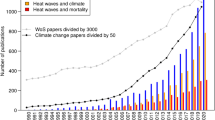Abstract
We use an integrated assessment model of climate change to analyze how alternative decision-making criteria affect preferred investments into greenhouse gas mitigation, the distribution of outcomes, the robustness of the strategies, and the economic value of information. We define robustness as trading a small decrease in a strategy’s expected performance for a significant increase in a strategy’s performance in the worst cases. Specifically, we modify the Dynamic Integrated model of Climate and the Economy (DICE-07) to include a simple representation of a climate threshold response, parametric uncertainty, structural uncertainty, learning, and different decision-making criteria. Economic analyses of climate change strategies typically adopt the expected utility maximization (EUM) framework. We compare EUM with two decision criteria adopted from the finance literature, namely Limited Degree of Confidence (LDC) and Safety First (SF). Both criteria increase the relative weight of the performance under the worst-case scenarios compared to EUM. We show that the LDC and SF criteria provide a computationally feasible foundation for identifying greenhouse gas mitigation strategies that may prove more robust than those identified by the EUM criterion. More robust strategies show higher near-term investments in emissions abatement. Reducing uncertainty has a higher economic value of information for the LDC and SF decision criteria than for EUM.










Similar content being viewed by others
References
Aaheim H, Bretteville C (2001) Decision-making frameworks for climate policy under uncertainty. Working paper 2001:02, CICERO, Oslo, Norway
Ackerman F, DeCanio SJ, Howarth RB, Sheeran K (2009) Limitations of integrated assessment models of climate change. Clim Change 95(3–4):297–315. doi:10.1007/s10584-009-9570-x
Alexander S, Coleman T, Li Y (2006) Minimizing CVaR and VaR for a portfolio of derivatives. J Bank Financ 30:583–605. doi:10.1016/j.jbankfin.2005.04.012
Alley RB, Marotzke J, Nordhaus W, Overpeck J, Pielke R, Pierrehumbert R, Rhines P, Stocker T, Talley L, Wallace JM (2002) Abrupt climate change: inevitable surprises. National Academy Press, Wasington, D.C.
Andersson F, Mausser H, Rosen D, Uryasev S (2001) Credit risk optimization with conditional value-at-risk criterion. Math Program 89:273–291. doi:10.1007/PL00011399
Andronova NG, Schlesinger ME (2001) Objective estimate of the probability density function for climate sensitivity. J Geophys Res 106:22605–22612. doi:10.1029/2000JD000259
Arrow KJ (2009) A note on uncertainty and discounting in models of economic growth. J Risk Uncertain 38(2):87–94
Bernstein L, Bosch P, Canziani O, Chen Z, Christ R, Davidson O, Hare W, Huq S, Karoly D, Kattsov V, Kundzewicz Z, Liu J, Lohmann U, Manning M, Matsuno T, Menne B, Metz B, Mirza M, Nicholls N, Nurse L, Pachauri R, Palutikof J, Parry M, Qin D, Ravindranath N, Reisinger A, Ren J, Riahi K, Rosenzweig C, Rusticucci M, Schneider S, Sokona Y, Solomon S, Stott P, Stouffer R, Sugiyama T, Swart R, Tirpak D, Vogel C, Yohe G (eds) (2008) IPCC, 2007: climate change 2007: synthesis report. Contribution of Working Groups I, II and III to the Fourth Assessment Report of the Intergovernmental Panel on Climate Change. IPCC, Geneva, Switzerland
Borsuk ME, Tomassini L (2005) Uncertainty, imprecision and the precautionary principle in climate change assessment. Water Sci Technol 52(6):213–225
Bradford DF (1999) On the uses of benefit-cost reasoning in choosing policy toward global climate change. In: Portney PR, Weyant JP (eds) Discounting and intergenerational equity. RFF Press, Washington, DC, pp 37–44
Bretteville Froyn C (2005) Decision criteria, scientific uncertainty, and the global warming controversy. Mitig Adapt Strategies Glob Chang 10:183–211. doi:10.1007/s11027-005-3782-9
Budescu DV, Kuhn KM, Johnson T (2002) Modeling certainty equivalents for imprecise gambles. Org Behav Human Decis Process 88:748–768. doi:10.1016/S0749-5978(02)00014-6
Du N, Budescu DV (2005) The effects of imprecise probabilities and outcomes in evaluating investment options. Manage Sci 51:1791–1803. doi:10.1287/mnsc.1050.0428
Ellsberg D (1961) Risk, ambiguity, and the Savage axioms. Q J Econ 75(4):643–669
Ellsberg D (2001) Risk, ambiguity and decision. Garland, New York
EPA (2010) Technical support document: social cost of carbon for regulatory impact analysis under executive order 12866. Interagency Working Group on Social Cost of Carbon, United States Government. http://www.epa.gov/oms/climate/regulations/scc-tsd.pdf. Accessed 17 June 2011
Fortin I, Fuss S, Hlouskova J, Khabarov N, Obersteiner M, Szolgayova J (2007) An integrated CVaR and real options approach to investments in the energy sector. Economic Series 209, Institute for Advanced Studies, Vienna
Goes M, Keller K, Tuana N (2011) The economics (or lack thereof) of aerosol geoengineering. Clim Change. doi:10.1007/s10584-010-9961-z
Hall J, Fu G, Lawry J (2007) Imprecise probabilities of climate change: aggregation of fuzzy scenarios and model uncertainties. Clim Change 81(3–4):265–281. doi:10.1007/s10584-006-9175-6
Hurwicz L (1951) Optimality criteria for decision-making under ignorance. Cowles Commission Discussion Paper, Statistics, No. 370
Keith DW (1996) When is it appropriate to combine expert judgments? Clim Change 33(2):139–143. doi:10.1007/BF00140244
Keller K, McInerney D (2008) The dynamics of learning about a climate threshold. Clim Dyn 30(2–3):321–332
Keller K, Tan K, Morel F, Bradford D (2000) Preserving the ocean circulation: implications for climate. Clim Change 47:17–43. doi:10.1023/A:1005624909182
Keller K, Bolker BM, Bradford DF (2004) Uncertain climate thresholds and optimal economic growth. J Environ Econ Manage 48:723–741. doi:10.1016/j.jeem.2003.10.003
Keller K, Deutsch C, Hall MG, Bradford DF (2007a) Early detection of changes in the North Atlantic meridional overturning circulation: implications for the design of ocean observation systems. J Climate 20:145–157. doi:10.1175/JCLI3993.1
Keller K, Kim SR, Baehr J, Bradford D, Oppenheimer M (2007b) Human-induced climate change. In: Schlesinger ME (ed) What is the economic value of information about climate thresholds? Harvard University Press, Cambridge, UK, pp 343–354
Keller K, McInerney D, Bradford DF (2008a) Carbon dioxide sequestration: how much and when? Clim Change 88:267–291. doi:10.1007/s10584-008-941
Keller K, Schlesinger M, Yohe G (2008b) Managing the risks of climate thresholds: uncertainties and information needs. Clim Change 91:5–10
Knutti R, Hegerl G (2008) The equilibrium sensitivity of the earth’s temperature to radiation changes. Nat Geosci 1:735–743. doi:10.1038/ngeo337
Kriegler E, Held H (2005) Utilizing belief functions for the estimation of future climate change. Int J Approx Reason 39(2–3):185–209. doi:10.1016/j.ijar.2004.10.005
Krokhmal P, Palmquist J, Uryasev S (2002) Portfolio optimization with conditional value-at-risk objective and constraints. J Risk 4(2):11–27
Lange A (2003) Climate change and the irreversibility effect combining expected utility and maximin. Environ Resour Econ 25(4):417–434. doi:10.1023/A:1025054716419
Larsen N, Mausser H, Uryasev S (2002) Algorithms for optimization of value-at-risk. In: Pardalos P, Tsitsiringos V (eds) Financial engineering, E-commerce, and supply chain. Kluwer Academic Publisher, Boston, pp 129–157
Latif M, Roeckner E, Mikolajewski U, R V (2000) Tropical stabilization of the thermohaline circulation in a greenhouse warming simulation. J Clim 13:1809–1813. doi:10.1175/1520-0442(2000)013<1809:L>2.0.CO;2
Lempert R, Sanstad A, Schlesinger M (2006) Multiple equilibria in a stochastic implementation of DICE with abrupt climate change. Energy Econ 28:677–689. doi:10.1016/j.eneco.2006.05.013
Lempert RJ (2002) A new decision sciences for complex systems. Proc Natl Acad Sci USA 99:7309–7313
Lempert RJ, Collins MT (2007) Managing the risk of uncertain threshold responses: comparison of robust, optimum, and precautionary approaches. Risk Anal 27(4):1009–1026. doi:10.1111/j.1539-6924.2007.00940.x
Lempert RJ, Popper SW, Bankes SC (2003) Shaping the next one hundred years: new methods for quantitative, long-term policy analysis. Tech. rep., RAND MR-1626-RPC
Link PM, Tol RSJ (2004) Possible economic impacts of a shutdown of the thermohaline circulation: an application of fund. Port Econ J 3:99–114. doi:10.1007/s10258-004-0033-z
Liu J, Men C, Cabrera V, Uryasev S, Fraisse C (2008) Optimizing crop insurance under climate variability. J Appl Meteorol Clim 47:2572–2580. doi:10.1175/2007JAMC1490.1
McInerney D, Keller K (2008) Economically optimal risk reduction strategies in the face of uncertain climate thresholds. Clim Change 91:29–41. doi:10.1007/s10584–006–9137-z
Morgan G, Dowlatabadi H, Henrion M, Keith D, Lempert R, McBrid S, Small M, Wilbanks T (2009) U.S. CCSP Synthesis and Assessment Product 5.2, Best practice approaches for characterizing, communicating, and incorporating scientific uncertainty in decisionmaking. Tech. rep., National Oceanic and Atmospheric Administration
Nordhaus W (1992) An optimal transition path for controlling greenhouse gases. Science 258:1315–1319
Nordhaus W (2007a) The challenge of global warming: Economic models and environmental policy. http://www.econ.yale.edu/~nordhaus/DICEGAMS/DICE2007.htm. Accessed 2 May 2007, model version: DICE-2007.delta.v7
Nordhaus W (2007b) A review of the Stern review on the economics of climate change. J Econ Lit 45(3):686–702. doi:10.1257/jel.45.3.686
Nordhaus WD (1994) Managing the global commons. The MIT press, Cambridge, Massachusetts
Nordhaus WD (2008) A question of balance: economic modeling of global warming. Yale Press
OMB (2003) Circular A-4: regulatory analysis. Office of Management and Budget, http://www.ombwatch.org/files/regs/OIRA/a-4-2003.pdf. Accessed 17 June 2011
Oppenheimer M, O’Neill BC, Webster M (2008) Negative learning. Clim Change 89(1–2):155–172. doi:10.1007/s10584-008-9405-1
Peterson GD, Carpenter SR, Brock WA (2003) Uncertainty and the management of multistate ecosystems: an apparently rational route to collapse. Ecology 84(6):1403–1411
Popp D (2004) ENTICE: endogenous technological change in the DICE model of global warming. J Environ Econ Manage 48:742–768. doi:10.1016/j.jeem.2003.09.002
Quaranta A, Zaffaroni A (2008) Robust optimization of conditional value at risk and portfolio selection. J Bank Financ 32:2046–2056. doi:10.1016/j.jbankfin.2007.12.025
Quiggin J (2008) Economists and uncertainty. In: Bammer G, Smithson M (eds) Uncertainty and risk: multidisciplinary perspectives, earthscan risk in society series, London, pp 195–204
Ramsey F (1928) A mathematical theory of saving. Econ J 38(152):543–559
Rawls J (1971) A theory of justice. Harward University Press
Ricciuto DM, Davis KJ, Keller K (2008) A Bayesian synthesis inversion of carbon cycle observations: how do observations reduce uncertainties about future sinks? Glob Biogeochem Cycles 22(GB2030). doi:10.1029/2006GB002908
Schienke E, Baum S, Tuana N, Davis K, Keller K (2011) Intrinsic ethics regarding integrated assessment models for climate management. Sci Eng Ethics 17(3):503–523. doi:10.1007/s11948-010-9209-3
Schneider SH, Semenov S, Patwardhan A, Burton I, Magadza C, Oppenheimer M, Pittock A, Rahman A, Smith J, Suarez A, Yamin F, Corfee-Morlot J, Finkel A, Füssel HM, Keller K, MacMynowski D, Mastrandrea MD, Todorov A, Sukumar R, Ypersele JPv, Zillman J (2007) Assessing key vulnerabilities and the risk from climate change. Cambridge University Press, Cambridge, UK, pp 779–810
Stern N (2008) The economics of climate change. Am Econ Rev 98(2):1–37. doi:10.1257/aer.98.2.1
Stocker T, Schmittner A (1997) Influence of CO2 emission rates on the stability of the thermohaline circulation. Nature 388:862–865
Tol R (1994) The damage costs of climate change: a note on tangibles and intangibles, applied to DICE. Energy Policy 22(5):436–438
Tol R (2003) Is the uncertainty about climate change too large for expected cost-benefit analysis? Clim Change 56(3):265–289. doi:10.1023/A:1021753906949
Urban NM, Keller K (2009) Complementary observational constraints on climate sensitivity. Geophys Res Lett 36(L04708). doi:10.1029/2008GL036457
Urban NM, Keller K (2010) Probabilistic hindcasts and projections of the coupled climate, carbon cycle, and Atlantic meridional overturning circulation systems: a Bayesian fusion of century-scale observations with a simple model. Tellus A 62(5):737–750. doi:10.1111/j.1600-0870.2010.00471.x
Weitzman ML (2001) Gamma discounting. Am Econ Rev 91(1):260–271
Welsch H (1995) Greenhouse-gas abatement under ambiguity. Energy Econ. 17(2):91–100. doi:10.1016/0140-9883(95)00010-R
Weyant JP (2009) A perspective on integrated assessment. Clim Change 95(3-4):317–323. doi:10.1007/s10584-009-9612-4
Zickfeld K, Bruckner T (2008) Reducing the risk of atlantic thermohaline circulation collapse: Sensitivity analysis of emissions corridors. Clim Change 91(3–4):291–315. doi:10.1007/s10584-008-9467-0
Zickfeld K, Levermann A, Morgan M, Kuhlbrodt T, Rahmstorf S, Keith D (2007) Expert judgements on the response of the Atlantic meridional overturning circulation to climate change. Clim Change 82:235–265. doi:10.1007/s10584-007-9246-3
Acknowledgements
We thank David Budescu, Nathan Urban, Marlos Goes, and Brian Tuttle for invaluable discussions. Partial funding from the U.S. National Science Foundation (Grant SES-0345925), and the Penn State Center for Climate Risk Management, is gratefully acknowledged. Comments from the editors and three anonymous reviewers helped to improve the exposition of the manuscript considerably. Of course, all errors and opinions are ours.
Author information
Authors and Affiliations
Corresponding author
Electronic Supplementary Material
Below is the link to the electronic supplementary material.
Rights and permissions
About this article
Cite this article
McInerney, D., Lempert, R. & Keller, K. What are robust strategies in the face of uncertain climate threshold responses?. Climatic Change 112, 547–568 (2012). https://doi.org/10.1007/s10584-011-0377-1
Received:
Accepted:
Published:
Issue Date:
DOI: https://doi.org/10.1007/s10584-011-0377-1




